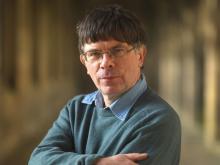Simon Conway Morris was born in 1951 and brought up in London. He is professor of evolutionary palaeobiology in the Department of Earth Sciences at the University of Cambridge.
In 1972 he received his BSc degree with first class honours in geology from the University of Bristol. Elected fellow of St John’s College in 1975, he received his PhD in 1976 from the University of Cambridge. In 1979 he was appointed lecturer in the Department of Earth Sciences at The Open University. Four years later, Dr Morris was appointed lecturer in the Department of Earth Sciences of the University of Cambridge.
He was appointed reader in evolutionary palaeobiology in 1991; in 1995 he was elected to an ad hominem chair in evolutionary palaeobiology at the University of Cambridge.
Dr Morris was elected Fellow of the Royal Society in 1990, he was awarded the Charles Doolittle Walcot Medal of the National Academy of Sciences in 1987, he won Yale University’s George Gaylord Simpson Prize in 1992, he was awarded the Lyell Medal of the Geological Society of London in 1998. In 2007 he received the Trotter Prize from Texas A&M University. He was a recipient of a science research fellowship from the Nuffield Foundation. In 2007 Professor Morris gave the Gifford Lectures at the University of Edinburgh entitled “Darwin’s Compass: How Evolution Discovers the Song of Creation”.
He has been the author of numerous articles published in prestigious journals, such as Nature, Science and Cell. He has also given many lectures and appeared on television and radio, including presenting the Royal Institution Christmas Lectures for the BBC in 1996. Dr Morris has written two books: The Crucible of Creation: The Burgess Shale and the Rise of Animals (1998) and Life’s Solutions: Inevitable Humans in a Lonely Universe (2003).
While he is best known for work on the Cambrian explosion, especially as related to Burgess Shale fossil fauna, more recently he has been interested in evolutionary convergence. Professor Morris has engaged in public debate, arguing against intelligent design on the one hand, and against materialism on the other.
Since 2005 Dr. Morris has been involved in the Cambridge-Templeton Consortium, a $5.5 million project funded by the John Templeton Foundation to encourage scientific research relevant to the continuing debate over the purpose of emerging biological complexity.



